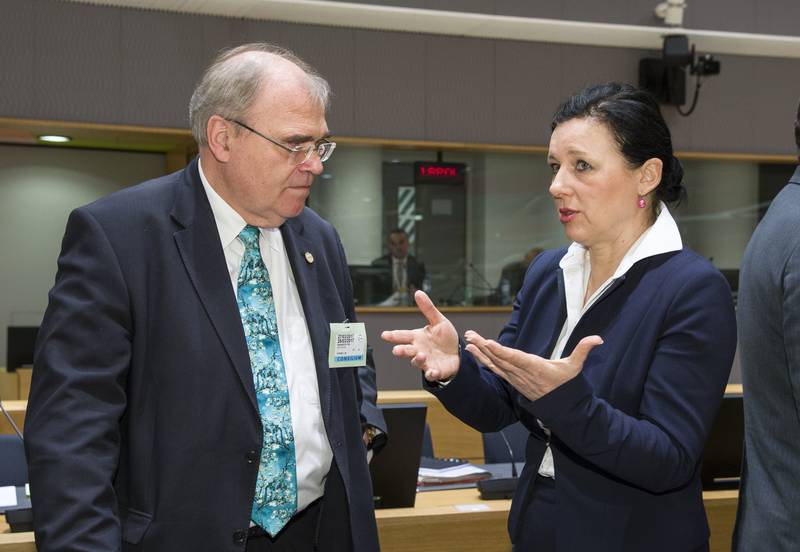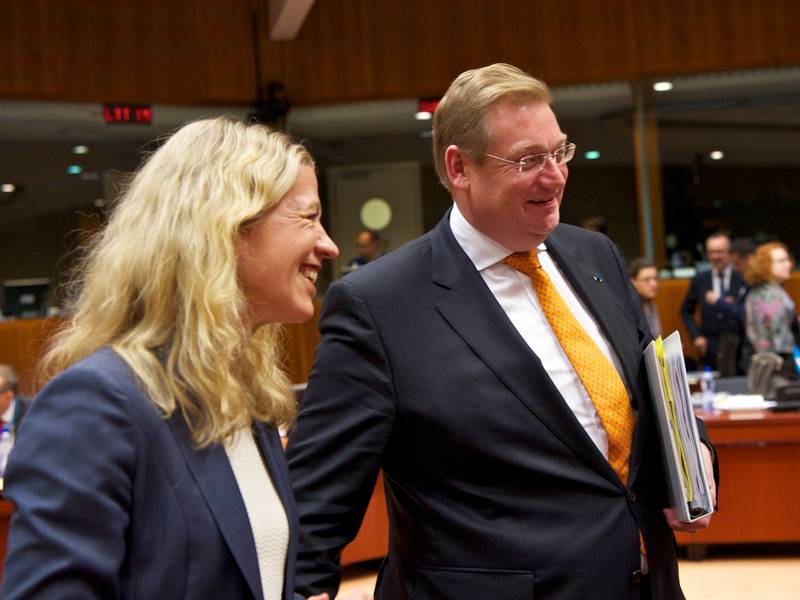16 Member States Will Establish the EPPO
Adelina Marini, April 5, 2017
 After nearly four years of negotiations, many concessions and compromises, and a significant change from the original proposal, the European Public Prosecutor's Office for combating financial fraud with EU funds will be created by only 16 member states in the so-called enhanced cooperation procedure. Countries that have agreed to proceed with the project are Belgium, Bulgaria, Croatia, Cyprus, the Czech Republic, Germany, Greece, Spain, Finland, France, Lithuania, Luxembourg, Portugal, Romania, Slovenia and Slovakia. Left out of the equation are some countries, which insisted on a strong, independent supranational institution, led by Italy, as well as countries that wanted a maximally loose and largely dependent on member states institution. Among non-participants one can see some moderate and some not so moderate eurosceptic countries.
After nearly four years of negotiations, many concessions and compromises, and a significant change from the original proposal, the European Public Prosecutor's Office for combating financial fraud with EU funds will be created by only 16 member states in the so-called enhanced cooperation procedure. Countries that have agreed to proceed with the project are Belgium, Bulgaria, Croatia, Cyprus, the Czech Republic, Germany, Greece, Spain, Finland, France, Lithuania, Luxembourg, Portugal, Romania, Slovenia and Slovakia. Left out of the equation are some countries, which insisted on a strong, independent supranational institution, led by Italy, as well as countries that wanted a maximally loose and largely dependent on member states institution. Among non-participants one can see some moderate and some not so moderate eurosceptic countries.
How did we get here?
In early December (December 8), the last public discussion on the text of the draft regulation took place, making it clear that the possibilities for compromise have already been exhausted. The Slovak Presidency presented the latest wording of the draft regulation which appealed to many, but drove away others. According to the Commissioner for Justice Věra Jourová (Czech Republic, ALDE), the text is significantly improved. She welcomed the inclusion in the scope of work of the EPPO VAT fraud and cross-border fraud. "This is a game changer and I am proud we managed to come that far", she said, and this time refused to make any remarks, which clearly showed that it is time the work on this extremely difficult dossier is completed. She did, however, refrain from saying so out loud, which would have supported the move towards enhanced cooperation.
A raw nerve was touched by the representative of France. “I think we've all made concessions in all good faith in order to try and achieve a good compromise, but a compromise which would not be to the detriment of out initial ambition to have a good EPPO. I really believe that we've come to the end of negotiations which were aimed at trying to reach unanimous agreement”. The representative stressed that the EPPO’s creation is not a matter of choice, but an obligation, stemming from Article 86 of the Treaty of Lisbon. France and Germany came out with a joint declaration, insisting on establishing the institution as soon as possible.
Belgium also announced that the draft regulation has come to the final stage and called for a move towards an enhanced cooperation procedure. Romania also supported continuing without the most sceptical countries in the hope that it will enable the text to be more ambitious, meaning the EPPO being more powerful and supranational. The Netherlands, which has long ago made it clear that it may not participate, urged anyway for giving more time to achieve unanimity and so the institution can become one for the entire EU. Dutch Minister Ard van der Steur said it was "it's too early to force member states to choose now or in 2 weeks for or against the text". In his words, the text is still not stable enough.
The Czech representative agreed that a few more weeks should be given to those who need to clarify some details, but stressed that this should not take too long. The then Bulgarian Minister of Justice Ekaterina Zaharieva urged not to waste any more time. "I also agree that some of the texts need to be improved, but, colleagues, we are lawyers and, trust me, should we work for three more years, we will still see texts we will believe that must be improved and written better. We must not lose time. The next presidency needs to as soon as possible, perhaps even at an emergency council, move towards the enhanced cooperation procedure already", was her appeal.
On 7 February the Justice and Home Affairs Council reported a lack of unanimity for the creation of a European prosecutor's office and forwarded the problem to be solved by the leaders of the member states. A month later - on March 9 - the leaders approved the proposal of 17 member states to move to enhanced cooperation.
The opponents
The most problematic countries during the negotiations were Poland and Hungary, but objections and reservations also came from Austria, Latvia, Spain, Italy and others. Almost all countries had rather technical remarks. In its last publicly expressed position on December 8 Poland stated it is not against the EPPO per se, but does not accept the text suggested by the Presidency. The main problem for Warsaw is the text about the EPPO’s competence and in particular their fears that its powers will be wider than expected. "We cannot accept this unjustified restriction of the competences of national prosecutor's offices" was the position of Poland. Hungary has long expressed resistance to many parts of the draft regulation, but its main problem is that the prosecution would, they believe, duplicate the responsibilities of OLAF and Eurojust. Budapest also disagrees with having VAT fraud be covered by the institution.
In the previous discussion Hungary declared its readiness to make constitutional changes in order to accommodate the EPPO, but in December the Parliament of Hungary expressed reservations on the subject, which means that there is no longer willingness to make such amendments. Austria expressed concern that the text, in its current state, will not let the prosecution function normally. Austria adamantly refused to support the text because of Article 26, which sets the framework for conducting cross-border investigations and indicates who, when, and in what situations has powers over national authorities.
Italy on the other hand did resort to threat by saying that in its current form, the text is not sufficiently ambitious and it will not support it, even if there is a move to an enhanced cooperation procedure. From the very beginning Italy insisted on the EPPO being strong and independent. Rome insisted that the scope of the institution is broad and covers even organised crime. Statements of Italian representatives in all three and a half years of negotiations were always very emotional and deep. Italy is not among the countries that will participate in the enhanced cooperation. A spokesperson for the Italian Permanent Representation to the EU told euinside that the country had insisted on  a much more ambitious text. Asked whether it is provided that in the future Italy will join the regulation, similar to statements made by other countries, the spokesperson said, "So far we said no. We will look and see".
a much more ambitious text. Asked whether it is provided that in the future Italy will join the regulation, similar to statements made by other countries, the spokesperson said, "So far we said no. We will look and see".
The working group will meet for the first time in the coming days when the text will be discussed by the experts. No major changes are expected. It may suffer changes, but they will be minor, because countries, who have stated participation in the project have already agreed on it to a large degree. So far, the controversial texts are in Articles 20, 26, 65. Article 20 deals with the powers of the EPPO, 26 - with cross-border investigations, and Article 65 – with the transparency of the work of the prosecution. Holdups on this article come from Finland, which believes that in the proposed text transparency is not enough. As Ekaterina Zaharieva commented, even with three more years to negotiate, there will always be a fault with text, while her Czech counterpart added that it is high time the project is put on water to see how it works. Surely there will be things that we haven’t thought of, or the opposite - things that we discussed for a long time may never happen, he said.
Malta, which currently presides the Council, will not take part in the procedure but pledged to work actively on it. In the procedure of enhanced cooperation, when it comes to the political level, the ministers of all member states participate, but the decision is made by only those who will participate - Belgium, Bulgaria, Croatia, Cyprus, Czech Republic, Germany, Greece, Spain, Finland, France , Lithuania, Luxembourg, Portugal, Romania, Slovenia and Slovakia.
All articles by euinside on the subject can be found here.
Translated by Stanimir Stoev
 Federica Mogherini | © Council of the EU
Federica Mogherini | © Council of the EU | © Council of the EU
| © Council of the EU Luis De Guindos | © Council of the EU
Luis De Guindos | © Council of the EU